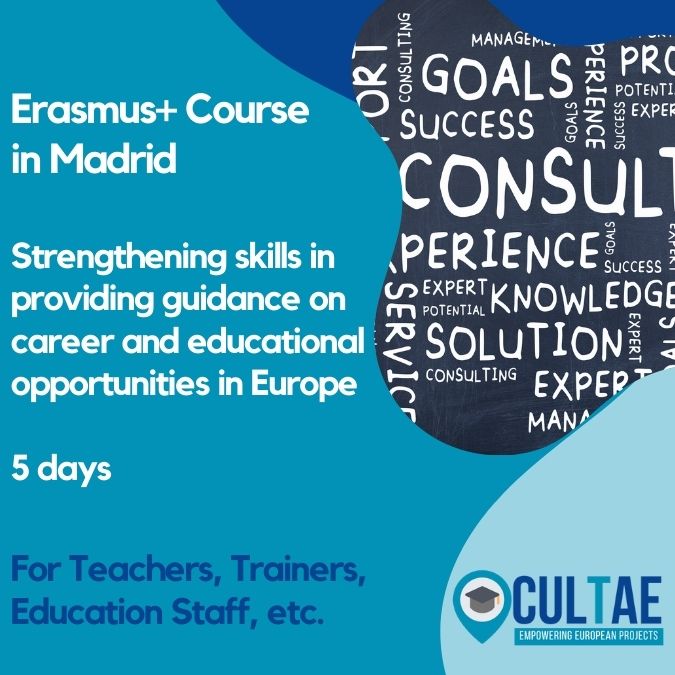
Contents:
Monday: Introduction to the course, the school and the course activities;
Non-formal Ice-Breakers;
Presentation of CULTAE and the host partner
Personal planning of learning routes in orientation on European opportunities. Digital tools to create a resource tree for students.
General European information resources. Other European information networks (Eurodesk, European Youth Portal, European Documentation Centres, Europe Direct, EYCA, Eryica, etc.)
Studying in Europe. Grants and information resources. Grants to go to Europe.
Evaluation
Tuesday: Working in Europe (Part 1)
Preliminary concepts: residence, permits, procedures, reference pages.
Internships in Europe. Pice grants, Erasmus+, Eurodyssea, etc. Web resources for internships in Europe.
Evaluation
Wednesday. Working in Europe (Part 2)
Working in Europe, job portals. Eures. Other private job portals. Sectoral employment portals. Demand/Supply of the sector.
Level and cost of living in other countries.
Entrepreneurship in Europe. Erasmus for Entrepreneurs.
Evaluation
Thursday. Volunteering in Europe.
European Solidarity Corps. Other volunteering opportunities. International volunteering portals and resources. Senior volunteering.
Development cooperation.
Evaluation
Friday. Practical advice before embarking on the European adventure
Accommodation resources. Strategies and advice. Practical information: what should I bring? What should I do once I arrive?
Strategies to enhance your CV. Translation of your CV and cover letter
Marketing and professional promotion tools
Saturday. Action plan
Action plan. Professional use of social networks. LinkedIn. ICT and social networks to find European opportunities.
Creative and responsible practices in the use of ICT.
Closing of the course and cultural activities
Course evaluation
Comprehensive self-assessment of acquired skills
Presentation of the course attendance certificate;
Study visit to a recruitment company in Italy.
A wide range of conceptual and practical subjects will be covered in the course, and participants will engage in hands-on activities, project work, peer learning, and participatory activities to enhance their comprehension and application.
Please be aware that the course description provided is merely meant to serve as an example and may not always be carried out exactly as described. Pre-evaluation of competencies, information presented at kick-off meetings, and enrollment data form the main basis of our need analysis. As a result, it’s feasible that the program will be modified to better suit the various demands of the participants.
Teachers of any subject, educators, and school administrative staff.
Teachers who work directly with adults in rural areas or in long-term unemployment, especially in the rural areas. Participants have experience in training for employment, but require updating in methodologies and approaches to social entrepreneurship for adults in areas with a lack of economic resources.
Language level requirements for participants: B1 or above
Maximum number of participants: 20
Minimum number of participants: 15
The course will cover a broad range of conceptual and practical topics, providing
participants with hands-on activities, project work, peer-learning and
participatory activities aimed at deepening understanding and application.
Assessment and validation of learning outcomes
A combination of brief entrance and final exams, rubrics, and data gleaned from work or other practice will be used to evaluate the learning objectives.
Once participants successfully demonstrate that they have met the course goals, they will get a certificate of completion.
Our training centre is located in Calle Buen Gobernador 5 (20 away from City Centre).
The hotel accommodation is 2-min walking distance from the training centre.
Minimum advance reservation : 12 weeks
Course dates are made available based on the availability of trainers but are “confirmed” only once the minimum number of participants (15) is reached.
The course usually takes place Monday to Friday and the full-day trip usually takes place on Sundays, so Sundays are arrival and departure days for those who book course, activities and accommodation. You can leave earlier if you book just the course.
Please register in advance for the days that are most convenient for you if they are either «To be confirmed» or not on the above list. This will allow us to keep track of your preferences, coordinate with everyone to get everyone on the same dates, and confirm the dates!
Your costs for flights, trains, airport transfers, train/bus tickets, taxis, meals, restaurants, and so on may be reimbursed by your Erasmus+ grant in addition to our invoice for teacher training courses; please save your receipts and submit a claim to your school or sending organization for any unclaimed funds. Please find our estimations of additional costs for the services you will need to purchase or make reservations for in order to attend our teacher training courses below:
Frequently Asked Questions
Find answers to commonly asked questions about our products and services.
